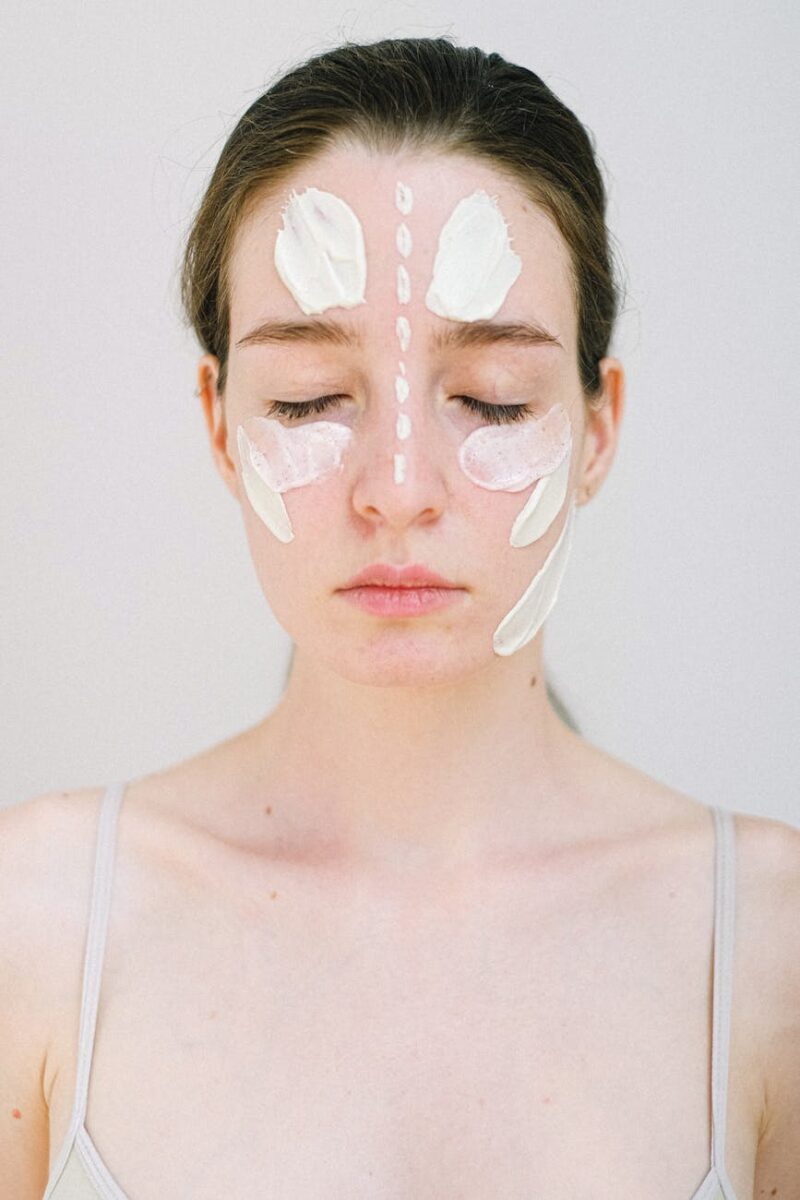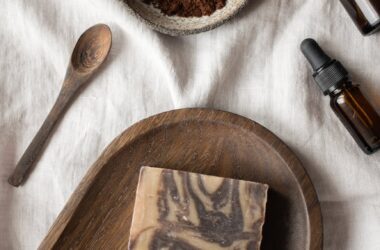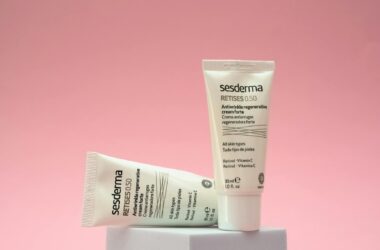If you are like me and have sensitive skin, then you’ll want to know if AHA is going to be good for your skin. Finding the right skincare product can be tough when you have sensitive skin.
This resource will explain what it is, and whether or not it is safe for sensitive skin.
Is AHA Safe For Sensitive Skin?
While AHAs are generally safe for all skin types, a less-is-more approach is recommended when you have sensitive or reactive skin.
If you’re concerned that your skin might not tolerate an AHA treatment, it’s best to do a patch test first.
How To Safely Use AHA For Sensitive Skin
Here are our tips on how to safely use AHA for sensitive skin:
1. Do a patch test for irritation
AHA can be irritating, especially if your skin is sensitive to begin with or if you have eczema.
The best way to make sure AHA doesn’t irritate your skin is to do a patch test. Apply a small amount of product on your lower forearm and leave it on for 24 hours.
If you don’t react within this time frame, it should be safe to use on your face.
You can also apply the product to your face and wait 20 minutes before rinsing it off to see how your skin reacts. If you notice any redness or itching, stop using the product immediately!
2. Start slowly
Once you know that AHA isn’t going to irritate your skin, start by applying the product once per week. Wait 3-4 days before increasing frequency of use (if needed).
If you experience irritation when you increase the frequency of use, go back to once a week until your skin adjusts and then try again.
I would also recommend starting with a low concentration AHA (4-8%).
3. Choose AHA products with lower concentrations
Start with products that have a concentration of 5% or less and work your way up to higher concentrations if your skin can handle it.
4. Limit your use of AHA products to once or twice a week
Only use them 3-4 times per week if you have very oily skin and can tolerate it well.
5. Don’t combine AHA products with other exfoliants on the same day
If you also use physical exfoliants like facial scrubs, sugar scrubs, or face brushes, don’t use them on the same day as your AHA treatment.
6. Always wear SPF
As mentioned earlier, AHAs exfoliate the topmost layer of the skin to reveal a brighter complexion. This means it makes your skin more photosensitive so always wear sunscreen.
How to Know Which AHA Product Is Right For Sensitive Skin
But how do you know which type of AHA is right for sensitive skin?
Let’s take a look at some tips for choosing the best one for your needs.
1. Listen to your skin
If you’re not sure what type of acid you need, listen to your skin. In general, AHAs are better for dry skin, while BHAs are better for oily or acne-prone skin.
2. Look at the ingredients labels
If you know that you want an AHA product, check out the ingredient list and look to see which specific AHAs it contains.
3. Do your research
Do your research on the percentage of acid in the product. You should aim for products containing between 5% and 8% of AHA/BHA for optimal results without causing irritation or redness.
4. Consider the type of AHA
Don’t just look at the percentage but also the type of AHA/BHA in a product if you have sensitive skin.
Glycolic and lactic acids are usually gentler than other types of AHAs like citric acid or tartaric acid since they don’t penetrate as deeply into the skin, so they may be a better choice for people with sensitive skin types.
5. Check out online reviews!
Reviews are a great way to see whether or not other people with sensitive skin types have had issues with a certain product.
If You Have Acne Or Rosacea, Can you Use AHAs?
Yes, you can use Alpha Hydroxy Acids (AHAs) in the treatment of acne and rosacea, but it is important to select the right formulation.
AHA products must be non-comedogenic and non-acnegenic in order to prevent clogged pores, which can lead to acne.
If you suffer from rosacea, you should choose a product that contains glycolic acid and lactic acid.
These two ingredients pose less irritation potential than other AHAs.
We recommend Glycolic 10 Renew Overnight for acne or rosacea sufferers who have normal skin types. For dry skin types, we recommend Phyto Corrective Gel.
Will Your Sensitive Skin Break Out From AHA?
The answer to this question is really simple: no.
To explain why we’ll need to take a step back and look at the role of AHA (alpha hydroxy acid) in skincare and acne treatment.
AHAs, which are found in foods like milk, sugar cane, and fruit, are known for their exfoliating properties.
That means they can be used to help remove dead skin cells from the surface of your skin. This is very helpful in addressing acne because dead skin cells contribute to clogged pores.
So while AHA isn’t a direct treatment for acne, it can help prevent clogged pores, which means you’re less likely to get pimples.
You might be wondering how this helps you if you have sensitive skin…well, AHAs are actually gentle enough that they don’t generally cause irritation or breakouts.
In fact, some people with sensitive skin find them helpful because they don’t cause further irritation on already sensitive skin!
Will My Skin Become Less Sensitive From Using AHA Products?
AHAs (alpha-hydroxy acids) work by gently exfoliating the upper layers of the skin to reveal a softer, more radiant complexion. They help stimulate collagen production, which is necessary for maintaining a youthful complexion.
AHAs can also help reveal younger-looking skin by removing dead skin cells from the surface.
This allows your moisturizer to penetrate more easily and allows any acne treatments you are using to work more effectively as well.
With regular use over time, you may find that your skin becomes less sensitive. For many people with sensitive skin or rosacea, this makes it easier for them to tolerate products that were previously too irritating. Dr. Sivendran agrees. “Regular use can decrease the sensitivity of the skin with time,” she says.
Does AHA Treat Wrinkles And Fine Lines On Sensitive Skin?
AHA is an exfoliant that removes dead skin cells from the upper layer of the skin. Although it is a gentle exfoliating agent, it can still cause irritation for sensitive skin.
AHA is not a treatment for wrinkles and fine lines. It does not penetrate into the deeper layers of the skin where collagen and elastin reside.
Benefits of AHAs for Sensitive Skin
When I was younger, I was very self-conscious about my skin. I had dark spots and uneven skin tone, which made me feel less confident.
Repairing my skin took a lot of time and effort. It’s not something that happened overnight.
After trying countless products and experimenting with my skincare routine, I finally found a way to restore my skin.
AHAs are one of the ingredients that changed my life. They’re exfoliating acids that have tons of benefits for people with sensitive skin, like me.
Here are just a few of the benefits:
1. Smooths out fine lines and wrinkles.
2. Fades dark spots and hyperpigmentation.
3. Reduces acne scars.
4. Treats acne by removing dead skin cells that clog pores.
5. Increases cell turnover rate to reveal brighter, healthier-looking skin.
6. Improves product absorption.
7. Protects against sun damage.
8. Acts as an antioxidant to protect against free radical damage.
Final Thoughts
As I’ve mentioned above, AHA is safe for sensitive skin and can be used on the face and body.
My personal experience using it on my face has been fantastic; there’s minimal to no irritation and breakout, and my skin looks smoother after using this toner.
However, if your skin is super sensitive then maybe you should try a patch test before applying it all over your face.







